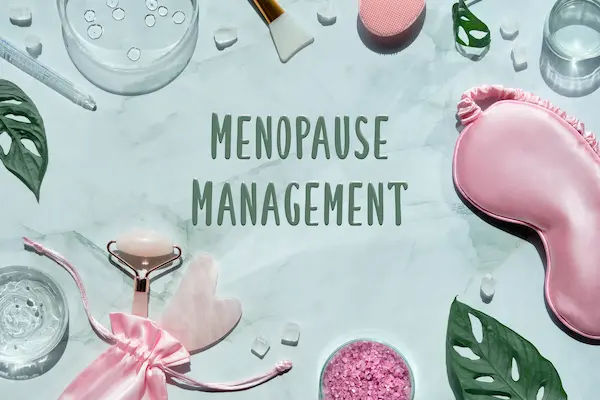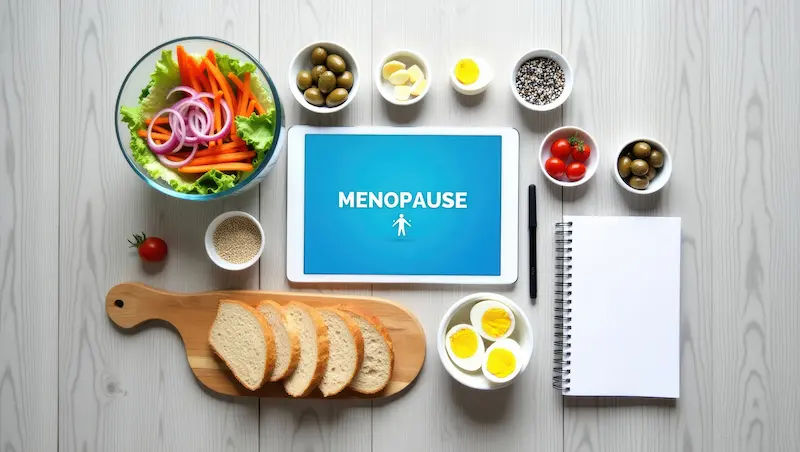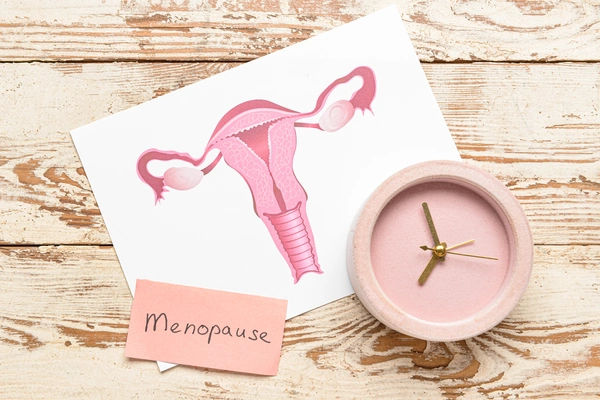Impact of Menopause on Women's Health
Learn how menopause affects women’s health, including its symptoms, risks, and long-term impact, along with ways to manage this natural transition effectively.

Written by Dr. Shaik Abdul Kalam
Reviewed by Dr. Rohinipriyanka Pondugula MBBS
Last updated on 13th Jan, 2026

Introduction
Menopause is far more than the end of menstruation; it's a significant hormonal transition that impacts nearly every aspect of a woman's health. From well-known symptoms like hot flashes to less-discussed effects on heart and bone health, understanding this change is the first step toward navigating it with confidence and grace. This comprehensive guide delves into the multifaceted impact of menopause on women's physical and mental well-being. We'll explore the common signs, the silent long-term risks, and most importantly, the empowering strategies you can use to manage symptoms, protect your health, and thrive during this new chapter of your life.
What exactly is Menopause? Defining The Transition
Menopause is a natural biological process marking the end of a woman's reproductive years. It is officially diagnosed after you have gone 12 consecutive months without a menstrual period. This doesn't happen overnight; it's a gradual transition driven by the ovaries producing less oestrogen and progesterone, the key hormones regulating menstruation.
The Three Stages: Perimenopause, Menopause, and Postmenopause
The journey is best understood in three parts. Perimenopause ("around menopause") is the lead-up, often starting in a woman's 40s. This is when hormone levels begin to fluctuate significantly, and symptoms like irregular periods and hot flashes first appear. Menopause itself is the single point in time after 12 period-free months. Postmenopause refers to all the years after this point. While acute symptoms may ease, the long-term health implications of lower oestrogen levels become the primary focus.
How Your Hormones Shift: The Role of Oestrogen and Progesterone
Oestrogen is a powerhouse hormone influencing not just the reproductive system but also the brain, heart, bones, and skin. Its decline is the main driver of most menopause symptoms. Progesterone, which prepares the body for pregnancy, also decreases. This hormonal shift is not a linear decline but often a chaotic fluctuation, which explains the unpredictability of many symptoms experienced during perimenopause.
Consult Top Specialists for Personalised Tips
The Immediate Impact: Recognising Common Menopause Symptoms
The drop in oestrogen can manifest in a wide array of symptoms, varying greatly in intensity from woman to woman. Recognising them is key to seeking appropriate management.
Vasomotor Symptoms: More Than Just Hot Flashes
The most stereotypical sign, vasomotor symptoms (VMS), affect up to 80% of women. A hot flash is a sudden feeling of intense heat in the upper body, often accompanied by flushing, sweating, and a rapid heartbeat. They can be disruptive, occurring day or night.
Night Sweats and Their Effect on Sleep Quality
When hot flashes occur at night, they are called night sweats. Soaking through sleepwear and bedding can severely disrupt sleep patterns, leading to chronic fatigue, irritability, and difficulty concentrating during the day, a major contributor to the phenomenon of "menopause brain fog."
The Psychological and Emotional Rollercoaster
The impact isn't just physical. Hormonal fluctuations can directly affect neurotransmitters in the brain, leading to significant mood changes. Many women experience uncharacteristic mood swings, irritability, feelings of sadness, or a loss of motivation.
The Link Between Menopause and Anxiety
New or worsening anxiety is a common but often overlooked symptom. The physiological sensations of hot flashes (heart racing, sweating) can mimic panic attacks, and the overall stress of this life transition can contribute to feelings of unease and anxiety.
Physical Changes: Skin, Hair, and Weight Distribution
Oestrogen supports collagen production and skin elasticity. As it declines, skin may become drier, thinner, and more prone to itching. Hair may thin or become brittle. Metabolism often slows down, and the body may start to store fat more readily around the abdomen instead of the hips and thighs.
The Silent Changes: Menopause's Effect on Urogenital and Sexual Health
These symptoms are often underreported due to embarrassment, but they are extremely common and can significantly impact quality of life and intimacy.
Genitourinary Syndrome of Menopause (GSM)
This is the comprehensive term for the collection of symptoms resulting from oestrogen loss in the genital and urinary tracts. It includes vaginal dryness, itching, burning, and pain during intercourse (dyspareunia). It can also cause urinary symptoms like increased frequency, urgency, and a higher risk of urinary tract infections.
Navigating Changes in Libido and Sexual Function
A decrease in libido is common due to hormonal shifts, physical discomfort from GSM, fatigue, and psychological factors. Open communication with a partner and a healthcare provider is crucial for addressing these changes and finding solutions, such as lubricants or vaginal oestrogen.
The Long-Term Health Implications of Postmenopause
The protective effects of oestrogen extend far beyond reproduction. Its long-term absence increases the risk of several serious health conditions.
Osteoporosis: Protecting Your Bone Density After 50
Oestrogen is critical for bone remodeling. Postmenopause, women can lose up to 20% of their bone density in the first 5-7 years, dramatically increasing the risk of osteoporosis and fractures. Weight-bearing exercise, adequate calcium and Vitamin D intake, and bone density scans are essential. Apollo24|7 offers convenient home collection for tests like vitamin D levels, making it easier to monitor your status.
Cardiovascular Health: Understanding the Shift in Risk Factors
Before menopause, women have a lower risk of heart disease than men. After menopause, this risk catches up. Declining oestrogen can lead to unfavorable changes in cholesterol levels (increased LDL "bad" cholesterol, decreased HDL "good" cholesterol) and increased stiffness in arteries. Prioritising heart-healthy habits becomes non-negotiable.
Metabolic Shifts and Weight Management Challenges
The hormonal changes of menopause can make it easier to gain weight and harder to lose it, particularly around the abdomen. This visceral fat is metabolically active and is linked to a higher risk of insulin resistance, type 2 diabetes, and heart disease. Adopting a nutrient-dense diet and regular activity is key to managing this metabolic shift.
Get Your Health Assessed
Taking Back Control: Effective Strategies for Managing Menopause
While menopause is inevitable, suffering through it is not. A proactive approach can dramatically improve your quality of life.
Lifestyle Modifications: Diet, Exercise, and Sleep Hygiene
Diet: Incorporate calcium-rich foods, phyto-oestrogens (e.g., soy, flaxseeds), and lean proteins. Reduce processed foods, sugar, and alcohol, which can trigger hot flashes.
Exercise: Regular weight-bearing and resistance training combat bone loss and weight gain. Cardiovascular exercise supports heart health. Yoga and Pilates can improve flexibility and reduce stress.
Sleep: Practice good sleep hygiene: a cool, dark room, a consistent bedtime, and avoiding screens before bed can help manage night sweats and insomnia.
Hormone Replacement Therapy (HRT): Weighing the Benefits and Risks
HRT (oestrogen alone or with progesterone) is the most effective treatment for relieving moderate to severe vasomotor and urogenital symptoms. It also helps prevent bone loss. However, it carries risks (e.g., small increased risk of blood clots, stroke, and breast cancer with certain types) and is not for everyone. If you are considering HRT, consult a doctor online with Apollo24|7 to discuss your personal and family history and determine if it's a safe option for you.
Non-Hormonal Medical Treatments and Alternative Therapies
For those who cannot or prefer not to use HRT, options include:
Non-hormonal medications: Low-dose antidepressants or anti-seizure drugs can help reduce hot flashes.
Vaginal moisturisers and lubricants: Provide immediate relief for dryness and discomfort.
Cognitive Behavioral Therapy (CBT): Proven to help manage low mood, anxiety, and sleep problems.
Alternative therapies: Some women find relief with acupuncture or herbal supplements like black cohosh, though evidence is mixed. Always discuss supplements with your doctor first.
When to Seek Professional Guidance
While many symptoms are a normal part of the transition, you should not hesitate to seek help. If symptoms persist beyond two weeks and are disrupting your daily life, relationships, or mental health, it's time to talk to a professional. A doctor can help you create a personalised management plan, rule out other potential causes for your symptoms, and monitor your long-term health.
Conclusion
The journey through menopause is unique for every woman, but its profound impact on women’s health is universal. It's a transition that demands attention, self-compassion, and a proactive approach to well-being. By understanding the changes happening in your body, from the disruptive hot flashes to the silent shifts in bone density, you empower yourself to take action. Embrace the strategies that work for you, whether it's refining your diet, committing to strength training, or having an open conversation with a healthcare provider. Remember, menopause is not an end but a new beginning. It's an opportunity to prioritise your health like never before, ensuring you not only manage this change but thrive through it for decades to come.
Consult Top Obstetrics and Gynaecology Surgeon
Consult Top Specialists for Personalised Tips

Dr. Somdutta Basu
Obstetrician and Gynaecologist
7 Years • MBBS, MS Obstetrics & Gynaecology
Bansdroni
Siddhita Healthcare., Bansdroni

Dr. Amodita Ahuja
Obstetrician and Gynaecologist
10 Years • MBBS, DGO, DNB (Obstetrics & Gynaecology)
New Delhi
AAKASH MEDSQUARE, New Delhi

Dr. Debashree Saha
Obstetrician and Gynaecologist
4 Years • MBBS, MS (Obstetrics & Gynaecology)
Kolkata
DR. DEBASHREE SAHA Clinic, Kolkata

Dr Homeira Nishat
Obstetrician and Gynaecologist
34 Years • MBBS, Diploma in Obstetrics & Gynaecology
Bengaluru
Cure Hospital and Clinic, Bengaluru

Dr. Ritika Khurana
Obstetrician and Gynaecologist
16 Years • MBBS, DGO(GYNAECOLOGY AND OBSTETRICS)
Pune
Dr Rupali and Dr Ritika, Pune
Consult Top Obstetrics and Gynaecology Surgeon

Dr. Somdutta Basu
Obstetrician and Gynaecologist
7 Years • MBBS, MS Obstetrics & Gynaecology
Bansdroni
Siddhita Healthcare., Bansdroni

Dr. Amodita Ahuja
Obstetrician and Gynaecologist
10 Years • MBBS, DGO, DNB (Obstetrics & Gynaecology)
New Delhi
AAKASH MEDSQUARE, New Delhi

Dr. Debashree Saha
Obstetrician and Gynaecologist
4 Years • MBBS, MS (Obstetrics & Gynaecology)
Kolkata
DR. DEBASHREE SAHA Clinic, Kolkata

Dr Homeira Nishat
Obstetrician and Gynaecologist
34 Years • MBBS, Diploma in Obstetrics & Gynaecology
Bengaluru
Cure Hospital and Clinic, Bengaluru

Dr. Ritika Khurana
Obstetrician and Gynaecologist
16 Years • MBBS, DGO(GYNAECOLOGY AND OBSTETRICS)
Pune
Dr Rupali and Dr Ritika, Pune
More articles from Menopause
Frequently Asked Questions
What are the first signs of perimenopause?
The earliest signs often include changes in your menstrual cycle (irregular periods, heavier or lighter flow), the onset of hot flashes or night sweats, and new sleep disturbances. Mood swings and vaginal dryness can also be early indicators.
Can menopause cause heart palpitations?
Yes, fluctuating hormones can temporarily disrupt the heart's electrical impulses, causing palpitations (a feeling of a racing, fluttering, or pounding heart). While often benign, it's important to discuss any new cardiac symptoms with a doctor to rule out other causes.
What is the best natural remedy for hot flashes?
Many women find relief by identifying and avoiding triggers like spicy food, caffeine, and alcohol. Practicing paced breathing techniques during the onset of a flash and wearing layers of lightweight clothing can also help manage them naturally.
Does menopause weight gain go away?
The metabolic shift makes weight management more challenging, but it is not impossible. The weight gain doesn't automatically 'go away,' but it can be effectively managed and reversed through a consistent combination of a calorie-conscious, nutrient-rich diet and regular strength-training and cardiovascular exercise.
How long do menopause symptoms typically last?
The duration varies widely. On average, women experience vasomotor symptoms like hot flashes for about 7-10 years. However, for some, they may last only a few years, and for others, they can persist for much longer into postmenopause.




